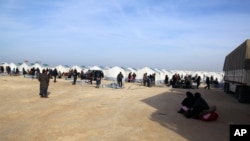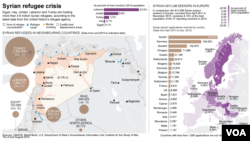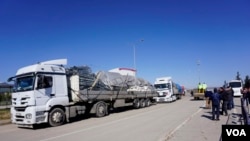More than 25,000 Syrian civilians have become the unwitting victims of a standoff between Turkey and Western relief agencies.
The Turkish government refuses to admit the refugees, the first in a wave of civilians fleeing an offensive by the regime of Syrian President Bashar al-Assad in the northern Aleppo countryside. Turkish officials say their country has reached the limit on the number of Syrian refugees it can admit.
A delegation of EU lawmakers was told Monday that the border will remain closed.
"A senior Turkish official told us, 'the refugees will stay [on] the other side of the border,'" an EU lawmaker told VOA.
In a bid to pressure the government of President Recep Tayyip Erdogan, United Nations and Western relief agencies are refusing to dispatch aid across the border to the refugees.
“Some relief organizations have asked us to assist them to transport supplies to help these newly-displaced Syrians, but we have declined,” a U.N. official told VOA. “If we agree, it is likely the Turks will continue to refuse to admit them.”
An official with the International Organization for Migration said, “Our position is clear: they are war refugees and they should be allowed into Turkey.”
Both officials asked not to be named in this article.
A senior EU official told VOA: "We are doing this to try to force Turkey's hand to open the border."
At Turkey’s Oncupinar border crossing, only a few relief trucks crossed Monday into Syria. The trucks that crossed were from the Independent Doctors Association, a private Syrian charity, the Turkish Red Crescent and IHH Humanitarian Relief Foundation, a Turkish NGO.
Most of the half-dozen trucks carried tents and camp construction material.
Desperation at border
Zakaria Ibrahim, who oversees the Syrian Red Crescent’s mission in Azaz, the closest Syrian town to the border here, says there are approximately 25,000 refugees on the Syrian side.
"There are 890 families — just over 6,000 people — right by the border crossing. Another 530 families — nearly 3,000 people — are in Azaz. And about another 9,000 are scattered along the border."
He said some of the displaced civilians, though, had gone further afield and his mission was not able to estimate their number.
“The only supply deliveries are coming from IDA, our colleagues in the Turkish Red Crescent and IHH,” he confirmed.”
He said the refugees are desperate to cross into Turkey.
“There are about 20 collective tents separate from the semi-permanent camp that has been there for months. The tents measure from 70 square meters to 100 square meters; but, they are not big enough to shelter everyone and some of the tents are for women and children only.”
He added, “There are only five latrines for these people and they are being used just by the women. The men have to relieve themselves in the fields.
“The longer the Assad offensive continues, more villages and towns are impacted. These people are just the first in a wave that will get bigger.”
The Syrian Red Crescent estimates that 25,000 civilians are now close to the border near Oncupinar, some sheltering in nearby villages.
Turkish officials put the number at more than 35,000 Syrians.
‘Nowhere else to go’
Turkish Deputy Prime Minister Numan Kurtulmus told CNN-Turk television Sunday his country has taken in three million refugees from neighboring countries, most of them Syrians.
In an enigmatic remark, he also said, "In the end, these people have nowhere else to go. Either they will die beneath the bombings and Turkey will ... watch the massacre like the rest of the world, or we will open our borders.”
Erdogan recently said, "If necessary, we have to and will let our brothers in.”
In the meantime, the Syrian Red Crescent's Ibrahim says the Turks are planning to ship across another 250 smaller tents for families.
While the Turkish government is refusing to let in Syrian refugees, it is refusing to allow out dozens of Western journalists at Oncupinar eager to cover the story.
Despite claiming the country has an “open border policy,” the Turkish government has had most of the crossings along the border closed for refugees for about a year. Syrians already registered in Turkey are allowed back and forth across the border, especially during religious holidays.
For the past week, even the traders’ corridor has been closed and the normal crowds milling around by the Oncupinar border post have disappeared — replaced by the press corps.







